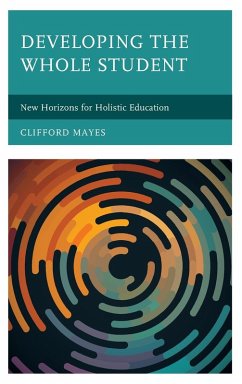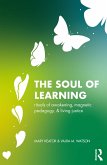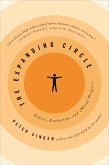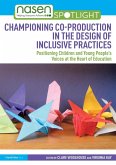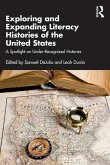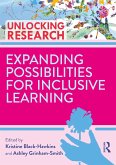- Gebundenes Buch
- Merkliste
- Auf die Merkliste
- Bewerten Bewerten
- Teilen
- Produkt teilen
- Produkterinnerung
- Produkterinnerung
This book proposes a new way of categorizing curricula in the holistic educational traditional.
Andere Kunden interessierten sich auch für
![The Soul of Learning The Soul of Learning]() Mary KeatorThe Soul of Learning52,99 €
Mary KeatorThe Soul of Learning52,99 €![The Expanding Circle The Expanding Circle]() Peter SingerThe Expanding Circle14,99 €
Peter SingerThe Expanding Circle14,99 €![The Tower of London: A Three-Dimensional Expanding Pocket Guide The Tower of London: A Three-Dimensional Expanding Pocket Guide]() Nina CosfordThe Tower of London: A Three-Dimensional Expanding Pocket Guide7,49 €
Nina CosfordThe Tower of London: A Three-Dimensional Expanding Pocket Guide7,49 €![Discovering the Expanding Universe Discovering the Expanding Universe]() Harry Nussbaumer (Zurich Swiss Federal Institute of Technology)Discovering the Expanding Universe67,99 €
Harry Nussbaumer (Zurich Swiss Federal Institute of Technology)Discovering the Expanding Universe67,99 €![Championing Co-production in the Design of Inclusive Practices Championing Co-production in the Design of Inclusive Practices]() Clare WoolhouseChampioning Co-production in the Design of Inclusive Practices42,99 €
Clare WoolhouseChampioning Co-production in the Design of Inclusive Practices42,99 €![Exploring and Expanding Literacy Histories of the United States Exploring and Expanding Literacy Histories of the United States]() Exploring and Expanding Literacy Histories of the United States56,99 €
Exploring and Expanding Literacy Histories of the United States56,99 €![Expanding Possibilities for Inclusive Learning Expanding Possibilities for Inclusive Learning]() Expanding Possibilities for Inclusive Learning33,99 €
Expanding Possibilities for Inclusive Learning33,99 €-
-
-
This book proposes a new way of categorizing curricula in the holistic educational traditional.
Produktdetails
- Produktdetails
- Verlag: Rowman & Littlefield
- Seitenzahl: 228
- Erscheinungstermin: 15. Januar 2020
- Englisch
- Abmessung: 235mm x 157mm x 18mm
- Gewicht: 490g
- ISBN-13: 9781475855586
- ISBN-10: 1475855583
- Artikelnr.: 58026190
- Herstellerkennzeichnung
- Libri GmbH
- Europaallee 1
- 36244 Bad Hersfeld
- gpsr@libri.de
- Verlag: Rowman & Littlefield
- Seitenzahl: 228
- Erscheinungstermin: 15. Januar 2020
- Englisch
- Abmessung: 235mm x 157mm x 18mm
- Gewicht: 490g
- ISBN-13: 9781475855586
- ISBN-10: 1475855583
- Artikelnr.: 58026190
- Herstellerkennzeichnung
- Libri GmbH
- Europaallee 1
- 36244 Bad Hersfeld
- gpsr@libri.de
Clifford Mayes, until his recent retirement a full professor of education psychology, is the author of 11 books and almost 40 articles in teaching. This has led to the formation of a school of instructional theory called "archetypal pedagogy," and Developing the Whole Student takes archetypal pedagogy to new areas of analysis and practice.
Foreword by Robert Bullough Acknowledgments Introduction: Holistic
Education in a New Key PART A: A Primer of Integrative Theory Chapter 1: On
Subjectivity and Objectivity in Integrative Educational Theory Chapter 2:
Features and Advantages of an Integrative Model Chapter 3: The Hierarchic,
Item-and-Process, and Pie-Chart Models Chapter 4: The Integrative Option
PART B: The Integrative Curriculum Chapter 5: The Consolidation of the Ego:
Domains 1 to 4 Domain 1: The Organismic Curriculum Domain 2: The Emotional
Curriculum Domain 3: The Empirical-Procedural Curriculum Domain 4: The
Legal-Procedural Curriculum Chapter 6: The Fruition of the Self: Domains 5
to 7 Domain 5: The Phenomenological Curriculum Domain 6: The Immanent
Curriculum Domain 7: The Ontological Curriculum PART C: An Exercise in
Integrative Teacher Reflectivity Chapter 7: A Study in Integrative
Reflectivity with Dr. Martin Kokol References Index
Education in a New Key PART A: A Primer of Integrative Theory Chapter 1: On
Subjectivity and Objectivity in Integrative Educational Theory Chapter 2:
Features and Advantages of an Integrative Model Chapter 3: The Hierarchic,
Item-and-Process, and Pie-Chart Models Chapter 4: The Integrative Option
PART B: The Integrative Curriculum Chapter 5: The Consolidation of the Ego:
Domains 1 to 4 Domain 1: The Organismic Curriculum Domain 2: The Emotional
Curriculum Domain 3: The Empirical-Procedural Curriculum Domain 4: The
Legal-Procedural Curriculum Chapter 6: The Fruition of the Self: Domains 5
to 7 Domain 5: The Phenomenological Curriculum Domain 6: The Immanent
Curriculum Domain 7: The Ontological Curriculum PART C: An Exercise in
Integrative Teacher Reflectivity Chapter 7: A Study in Integrative
Reflectivity with Dr. Martin Kokol References Index
Foreword by Robert Bullough Acknowledgments Introduction: Holistic
Education in a New Key PART A: A Primer of Integrative Theory Chapter 1: On
Subjectivity and Objectivity in Integrative Educational Theory Chapter 2:
Features and Advantages of an Integrative Model Chapter 3: The Hierarchic,
Item-and-Process, and Pie-Chart Models Chapter 4: The Integrative Option
PART B: The Integrative Curriculum Chapter 5: The Consolidation of the Ego:
Domains 1 to 4 Domain 1: The Organismic Curriculum Domain 2: The Emotional
Curriculum Domain 3: The Empirical-Procedural Curriculum Domain 4: The
Legal-Procedural Curriculum Chapter 6: The Fruition of the Self: Domains 5
to 7 Domain 5: The Phenomenological Curriculum Domain 6: The Immanent
Curriculum Domain 7: The Ontological Curriculum PART C: An Exercise in
Integrative Teacher Reflectivity Chapter 7: A Study in Integrative
Reflectivity with Dr. Martin Kokol References Index
Education in a New Key PART A: A Primer of Integrative Theory Chapter 1: On
Subjectivity and Objectivity in Integrative Educational Theory Chapter 2:
Features and Advantages of an Integrative Model Chapter 3: The Hierarchic,
Item-and-Process, and Pie-Chart Models Chapter 4: The Integrative Option
PART B: The Integrative Curriculum Chapter 5: The Consolidation of the Ego:
Domains 1 to 4 Domain 1: The Organismic Curriculum Domain 2: The Emotional
Curriculum Domain 3: The Empirical-Procedural Curriculum Domain 4: The
Legal-Procedural Curriculum Chapter 6: The Fruition of the Self: Domains 5
to 7 Domain 5: The Phenomenological Curriculum Domain 6: The Immanent
Curriculum Domain 7: The Ontological Curriculum PART C: An Exercise in
Integrative Teacher Reflectivity Chapter 7: A Study in Integrative
Reflectivity with Dr. Martin Kokol References Index

